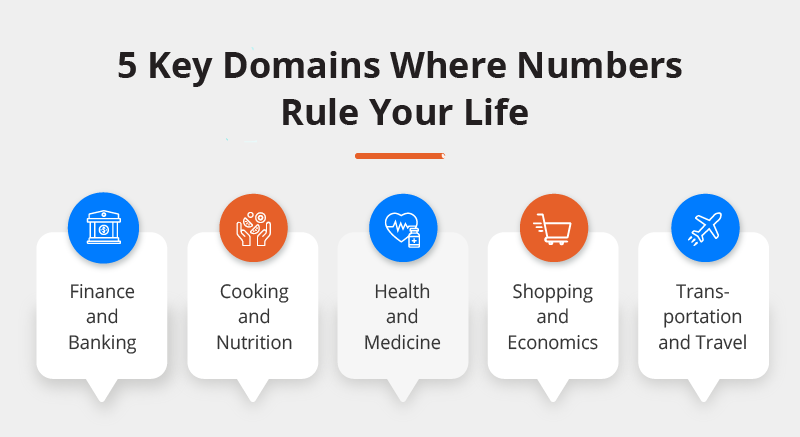Why Do You Learn Math in School? Discover 5 Ways It Helps in Everyday Life

Mathematics can be seen as a tricky subject, leaving many of you wondering, ‘Why do we even study math?’ But the truth is, math is like a toolbelt for everyday life. It helps you solve real-world puzzles, make sense of the world around you, and collaborate on finding solutions. Here you’ll uncover the practical side of math that proves it’s not just numbers and equations; it’s your secret power in daily life. Discover how math isn’t just about school; it’s about making life simpler and more interesting. Let’s explore how math isn’t just a subject; it’s a life skill.
Real-Life Math Applications
Mathematics is an essential part of your everyday life. You can use math to manage your finances, measure things, and determine the likelihood of events.
Here are some of the practical math applications that can help us navigate your life better:
1. Budgeting and Finance
Budgeting is a fundamental financial math concept that everyone should master. Creating a budget that allocates funds to different areas of spending is essential in keeping your finances in order. You can use simple arithmetic to calculate your monthly bills, expenses, and savings. Through the use of analytical tools such as Microsoft Excel or Google Sheets, you have access to budget templates and graphical representations of your financial plans.
2. Measurement and Conversions
Measuring things accurately is essential in daily activities like cooking, carpentry, or even athletics. With the help of math, you can convert measurements from one unit to another, such as from millimeters to centimeters or pounds to kilograms. Learning the metric system is a vital skill to have, as it is the standard of measurement in most scientific fields.
3. Statistics and Probability
Statistics play a crucial role in the interpretation of data. You can use math to analyze data, find trends, and create graphs to help you understand the information better. With the rise of big data, statistical analysis has become a valuable tool in many industries, including healthcare, finance, and sports.
Mathematics is not limited to academics but can be applied in our daily lives. By understanding and utilizing practical math applications, we can navigate the world around us with more confidence, save money, measure accurately, and interpret data.
Math in Daily Activities

Math isn’t just about solving equations and filling out worksheets. It’s all around us, even in our daily activities. From shopping to cooking to gardening to DIY projects, there are numerous ways in which math plays a role in our lives.
1. Math in Shopping
Mathematics is often seen as a daunting subject, but in reality, its practical implications extend far beyond the textbook. By understanding these applications, you can develop a deeper appreciation for the power of math and its role in your daily life. Whether you’re shopping for a car or applying for a mortgage, understanding basic financial calculations can save you significant amounts of money. Being able to calculate percentages for discounts, compound interest, and budgeting can be a game-changer. Understanding mortgages and loans can help you make informed decisions about your finances and investments.
2. Math in Cooking
Cooking may seem like an art, but it’s also a great place to utilize your math skills beyond measuring cups and spoons. Understanding weights and measurements, converting between metric and imperial systems, scaling up or down the recipes, and ensuring precise timing and temperature are crucial. Knowing how to convert measurements, ideal temperature, and time requirements, and how to adjust a recipe proportionately will elevate any cook’s skills. After all, cooking is a science, and math is its backbone.
3. Math in Travel
Math is an essential skill when it comes to traveling. Whether you are planning a road trip or an international journey, math comes into play every step of the way. You need to calculate distances and travel time, convert currency, budget and evaluate expenses, and understand exchange rates. For example, converting currency helps you make informed decisions when making purchases, while budgeting helps you plan your trip within your means. Understanding exchange rates helps you get the most out of your money. With practical math applications, traveling becomes more enjoyable, and you get to stretch your money further.
4. Math in Home Improvement
Whether you’re renovating your own place or fixing up a rental property, math is essential for home improvement projects. From calculating the area and volume of a space to determining the amount of materials needed, math skills are a must-have. Understanding angles and measurements is also crucial for ensuring that your projects are accurately executed. Moreover, proper budgeting and project planning can prevent a lot of headaches down the line. Make sure to brush up on your math skills before starting your next home improvement adventure.
To assist you in mastering the art of learning mathematics, we’ve got a great resource for you. Explore the art of mathematics blog for an enjoyable and interactive approach to mastering math.
5. Math in Health and Fitness
Math plays a vital role in monitoring and improving your health and fitness. Calculating body mass index (BMI) helps determine one’s optimal weight goals. Measuring progress through regular weight and measurement checks can guide a fitness regimen. Understanding nutrition labels can help you create a balanced diet plan, and calorie intake and expenditure calculations aid in goal setting. So, the next time you hit the gym or plan a meal, remember that math is your secret tool to reach your health and fitness milestones.
6. Gardening
Gardening is another great way to put math into practice. From measuring the area of your garden to calculating the amount of fertilizer to use, math is crucial to a successful garden. For example, you need to measure the area of your garden to determine how much soil and seed you need. You also need to calculate the proper amount of fertilizer to use, based on the size and type of plants you are growing.
7. DIY Projects
Whether you’re building a bookshelf or painting a room, DIY projects require a lot of math. From measuring the space to calculating the amount of paint or wood needed, math is the foundation of DIY. For example, let’s say you’re building a bookshelf. You would need to measure the space where the bookshelf will go, calculate the dimensions of the shelf, and determine how much wood and screws you need. Even the angles of the cuts required to create the shelves and frame require math skills.
Learning Practical Math
Math is essential to inspire yourself to connect math to your daily life. One way to do this is by incorporating math into everyday activities such as grocery shopping, cooking, and measuring objects. These simple tasks can incorporate basic mathematical concepts like addition, subtraction, and measurement that you can easily comprehend.
Another great way to learn math is through math journals. Math journals are an excellent channel to articulate your understanding of math topics, reflect on your challenges and struggles, and develop your metacognitive abilities.
Lastly, designing real-life math problems for yourself to solve can help you understand complex mathematical concepts better. For instance, calculating the tip at a restaurant, helps you learn essential skills like percentages and decimals.
Wrapping Up
Learning math subjects beyond textbooks can uplift your everyday life. By incorporating math into everyday activities, using math journals, and designing real-life math problems, you can inspire and enhance your mathematical abilities. Emphasizing the practical applications of math in your daily routine and encouraging yourself to embrace math will benefit not only your learning abilities but also your personal and professional life.
Last Updated on April 16, 2025










